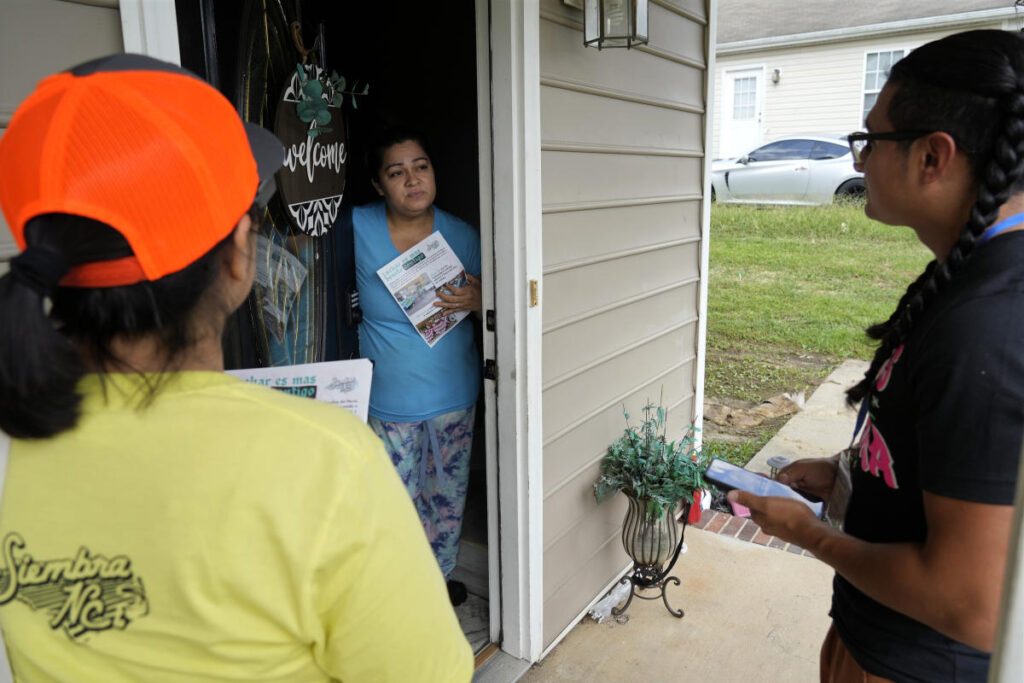In the lead-up to the November election, left-leaning voter engagement groups are focusing their efforts on mobilizing uncommitted voters of color, a key group that aligns with Vice President Kamala Harris’s campaign strategy. Following her emergence as the Democratic nominee after President Biden’s withdrawal, there has been a renewed sense of enthusiasm within these organizations. However, many groups face the challenge of familiarizing potential voters with Harris and her policies, particularly due to her late entry into the race. This situation is exacerbated by a general lack of excitement regarding a rematch between Biden and former President Trump, prompting Republican efforts to gain traction with Black and Latino voters.
Grassroots organizations like Siembra NC, focused on Latino engagement in North Carolina, have discovered that many potential voters show interest in local and state races but are hesitant to support candidates at the top of the ticket, including both Trump and Harris. Activists emphasize the need for ongoing trust-building conversations with these communities to explain the political ramifications of abstaining from voting. Through initiatives such as organizing local events and discussions around relevant issues, these groups aim to bridge the gap and motivate individuals to participate in the election.
While activists have reported renewed enthusiasm since Harris became the nominee, substantial challenges persist, particularly around voter turnout. Mobilizing undecided voters, especially among Black and Latino men, remains crucial as the election approaches. Obstacles include restrictive voting laws enacted in various Republican-controlled states and attempts to purge voter rolls, which have left many eligible voters uncertain about their status. Additionally, broader geopolitical issues, such as conflicts in the Middle East, are impacting engagement efforts for organizations like Asian Americans Advancing Justice in Atlanta, highlighting the need for accountability from parties and candidates.
In Texas, the removal of over a million voters from the rolls since 2021 has raised alarms among voter outreach groups concerned about disenfranchisement, particularly among the growing Asian population. Language barriers further complicate efforts to engage with these communities, as new challenges arise in response to demographic shifts. Despite these obstacles, there has been a surge in voter registrations following Biden’s exit from the race. Nonprofit group Voto Latino reported registering over 50,000 individuals in the wake of the announcement, with significant increases noted especially among young voters in key battleground states.
The involvement of historically Black organizations, often referred to as “The Divine Nine,” has notably invigorated Harris’s campaign efforts among Black voters. These organizations have spearheaded voter registration drives at prominent HBCUs, fostering civic engagement. Students have expressed heightened enthusiasm about voting for a groundbreaking candidate like Harris, seeing her potentially historic election as a motivating factor. Concurrently, groups like Delta Sigma Theta sorority are utilizing advertising campaigns to emphasize important issues affecting Black communities, aiming to reach lower-propensity voters and those who may feel disconnected from the electoral process.
In summary, voter engagement groups are navigating a complex electoral landscape as they work to mobilize communities of color before the November elections. Despite the challenging environment, there is increased activity surrounding voter registration and turnout efforts. The enthusiasm generated by Harris’s nomination presents an opportunity for these organizations to connect with voters. However, they must also address significant barriers, including distrust, legislative restrictions, and community-specific concerns. The combined efforts of grassroots activists, educational initiatives, and targeted outreach campaigns are crucial to shaping the outcome in key states where small margins could decide the election.

